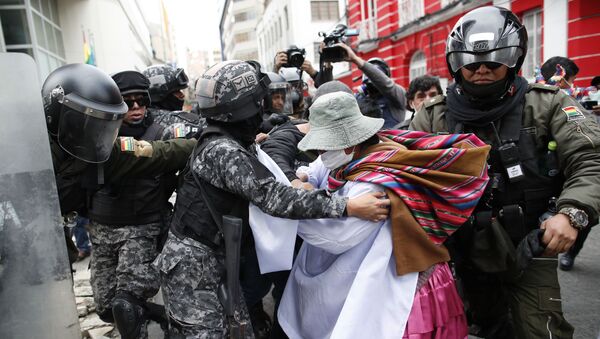As Bolivia braces for its 3 May elections, officials from the Organisation of American States (OAS) came to the country last week to provide technical support. According to Bolivia’s ambassador to the OAS Jaime Aparicio, the transnational organisation is slated to be involved in the entire election process through the day of vote.
With that in mind, it's worth noting that it was the OAS that issued a misleading statement the day after the 20 October vote in Bolivia, as a group of political researchers explained in their analysis for the Guardian in December. The organisation presented no evidence to back its "deep concern and surprise" at the "hard-to-explain change in the trend of the preliminary results" revealed after polls were closed, which was interpreted as evidence of probable "election fraud" and subsequently led to social unrest and Evo Morales' ouster.
Why OAS Lost Its Credibility in Bolivia & Beyond
"Most recently due to its role in past elections, the OAS has lost credibility in our country and not only among Movement Towards Socialism (MAS) supporters," says Camila Ugalde Soria Galvarro, a journalist with the left-wing media outlet La Resistencia Bolivia. "If the persecution and censorship that was seen during the last months continues – against MAS supporters or anyone who opposes the current de facto government – there are no basic conditions for free and fair elections in Bolivia. If on top of all that the OAS participates in the organisation of the new elections, democracy in our country will continue to be weakened."
Previously, the OAS refused to recognise the legitimacy of Nicolas Maduro's new term following the May 2018 Venezuelan presidential election and went on to embrace self-proclaimed interim president Juan Guaido and his cabinet.
Ugalde recalls that during the “black October” of 2003 in Bolivia, the OAS supported US-backed President Gonzalo Sánchez de Lozada, who ordered a massive crack-down on protesters in El Alto which resulted in the death of 60 people.
According to the journalist, instead of the OAS, the electoral commission should include other international bodies and elected governments to ensure the fairness and transparency of the May vote. She echoed Andrónico Rodríguez, MAS' potential vice president pick, who earlier argued that the OAS "should stay on the margins of this electoral process".
Anez Gov't Silencing Opposition Voices Ahead of Elections
The wide-scale persecution of left-wing and independent media sources by the de facto interim government of Jeanine Anez has prompted the further concern of MAS and its supporters.
"In the past several months, 53 local and community-based radio stations have been shut down, two important international media networks, TeleSUR and RT, were taken off the airwaves, and independent journalists and political cartoonists are being censored and even detained," Ugalde underscores.
She warns that "given this context – particularly months before the elections – the plurality of views that strengthen any democracy is currently being heavily besieged".
La Resistencia Bolivia's Alejandra Salinas and Orestes Sotomayor were detained on New Year's Eve and charged with “sedition” and “misuse of state assets”, even though no evidence was presented to back the claims. Ugalde highlights that the two journalists have been publicly labelled as "Morales' digital warriors" by the de facto government.
According to her, "such an attack against freedom of speech, directed at an alternative media platform that has been operating throughout the last couple of years and has provided information on a daily basis on the events that transpired during the coup, can only be seen as clear political persecution."
In sharp contrast to the de facto government in La Paz, former Bolivian President Evo Morales "never used his power to silence opposition media" she stresses.
Anez' Attempts to Weaken MAS Prove Futile
Ugalde points out that the de facto government of Anez has sought to weaken MAS and disrupt the party's potential campaign from day one of the coup d'etat.
"Part of the efforts to weaken MAS’ position in this electoral race was to proscribe the party under the argument of the alleged fraud, as Jeanine Anez declared in an interview: 'The Electoral Tribunal that is going to be formed has to carry it out (the ban). They will have to give a ruling in relation to a political party that has committed electoral fraud.' These statements have raised many questions around the fairness and transparency of the upcoming elections, particularly among MAS supporters," the journalist notes.
🇧🇴 Luis Arce and Andrónico Rodríguez have been nominated to be presidential and vice presidential candidates for the Movement Towards Socialism, at a rally today in the town of Pongo (Cochabamba). pic.twitter.com/s0G1Kg8Mn5
— Ollie Vargas (@OVargas52) January 13, 2020
Nonetheless, despite the aforementioned measures, the Morales party leads the latest polls, with a margin of 20 points even without a clear presidential candidate, Ugalde says, adding that MAS actually represents over 40 percent of Bolivia's population.
There seems to be a geographical divide. Altiplano movements (in La Paz, Potosí, Chuquisaca) are nominating David Choquehuanca (secretary of Alba, seen by some as a 'moderate'), whereas, in parts of Cochabamba and Santa Cruz, Luis Arce is being chosen. pic.twitter.com/L0E20DHwRr
— Ollie Vargas (@OVargas52) January 13, 2020
"Currently there are many strong leaders in MAS but four names stand out; these are: Luis Arce Catacora former Minister of Economy and Finance and an important figure in Bolivia’s historical economic transformation in the past 14 years, Andrónico Rodriguez, current vice president and leader of the Six Federations of the Tropics, a 30-year-old who has become a natural successor to Morales, and David Choquehuanca and Diego Pary both former foreign ministers," she elaborates, adding that "it is likely that a unifying and strong pairing might include Andrónico and Luis Arce to continue Bolivia’s Process of Change".


